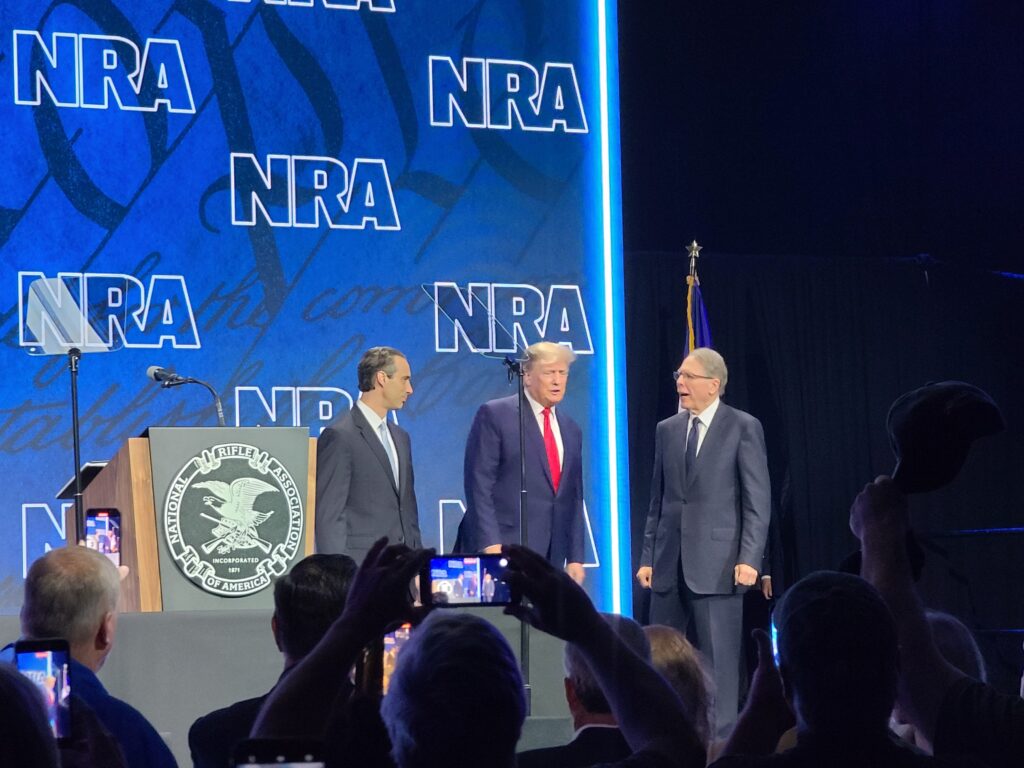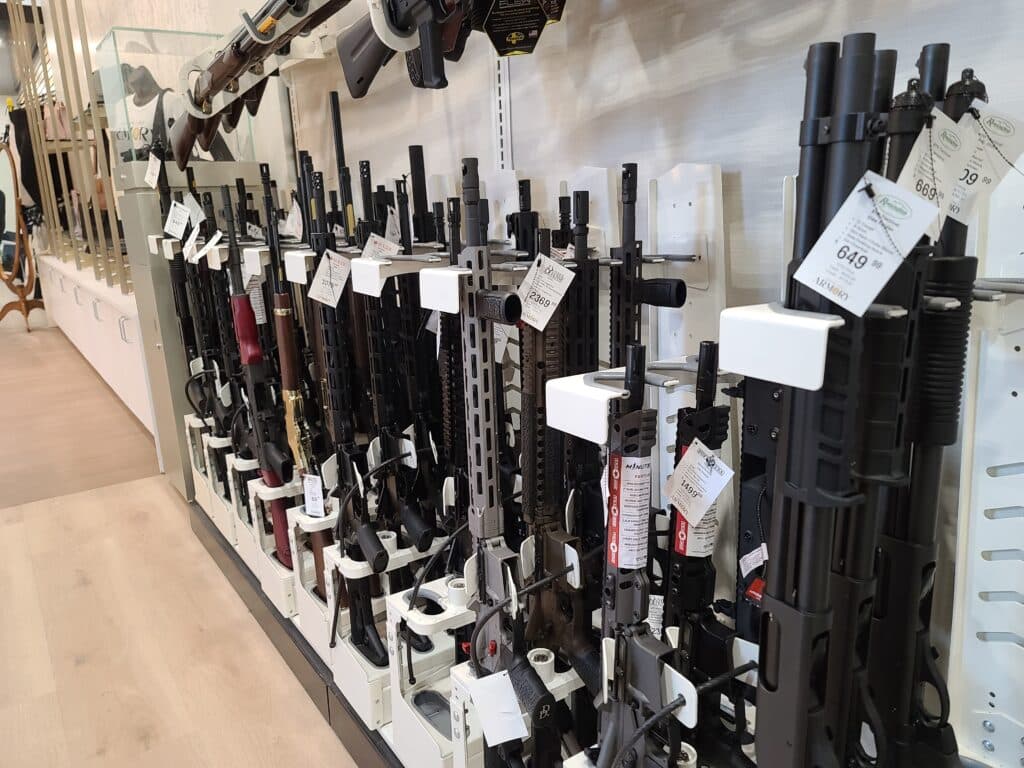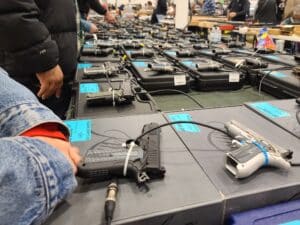Donald Trump was at the top of the news stack this week thanks to a CNN town hall where he was, well, Donald Trump. Like all of you, I have plenty of thoughts on all the different things he said. But, I assume, you come here for sober analysis of his gun comments and not my general opinions on the various candidates for office.
So, to that end, I’ve done a deep dive into Trump’s dismissal of his bump stock ban as something “very unimportant.” There are several reasons–both legal and political–to think he’s wrong.
Speaking of deep dives, Contributing Writer Jake Fogleman has another one on the books. He read Tennessee Governor Bill Lee’s (R.) “red flag” proposal and compared it to what has passed elsewhere. There are significant differences, but will they be enough to placate lawmakers and gun-rights advocates?
Plus, Cam Edwards from Bearing Arms joins the podcast to talk about the Tennessee “red flag” proposal and Trump’s bump stock comments.

Analysis: Despite Trump Claim, Bump Stock Ban is Important [Member Exclusive]
By Stephen Gutowski
Former President Donald Trump (R.) hand waved his decision to unilaterally ban bump stocks in the wake of the Las Vegas shooting as “very unimportant.” But the ban was enormously consequential both legally and politically.
On Wednesday, Trump was asked about his ban by a Republican primary voter at CNN’s town hall.
“As you know, the bump stocks are actually a very unimportant thing,” Trump replied. “NRA I went with them, and they said, ‘it doesn’t mean anything, or actually all they do is teach you how to shoot very inaccurately.’ So, we did that.”
It is true that the National Rifle Association (NRA) supported instituting the ban via executive order after balking at a legislative ban they argued went too far. Trump listened to NRA and issued an order to have the ATF craft a rule banning the devices as unregistered machineguns–possession of which could lead to upwards of ten years in prison under the National Firearms Act (NFA). However, he turned a deaf ear when the NRA complained the rule went too far by refusing to exempt those who’d legally bought the stocks before Trump ordered the rule.
The result was a total confiscation order for bump stocks from the Trump Administration. Despite previously ruling bump stocks were legal to buy without special regulations under the Obama Administration, the ATF declared under Trump the stocks are actually machineguns and aren’t legal to buy and never were. Only destroying the stock you owned or turning it over to the ATF without compensation were offered as remedies to avoiding potential federal felony charges.
The ATF had made its fair share of contradictory or incoherent rules and determinations before the bump stock ban–it had once claimed pressing a pistol-brace-equipped gun to your shoulder constitutes redesigning it on the fly.
However, the bump stock ban was one step further than many of the agency’s previous proclamations. It was based on a lie. One that the Fifth Circuit Court of Appeals has since called out.
A bump stock is a device that helps a shooter to accomplish the bump firing shooting technique–a technique that can be done without the stock or any other modification. It assists the shooter in harnessing a gun’s recoil to actuate the trigger more quickly than would be possible using traditional shooting techniques. But it still requires the trigger to be pressed for every shot.
Under the NFA, a “machinegun” is any gun that can automatically shoot “more than one shot without manual reloading, by a single function of the trigger.”
And that’s where the rub comes in. A bump stock doesn’t fit the definition of a machinegun despite what the Trump Administration said. That was a crucial point in the Fifth Circuit’s ruling that the results of Trump’s executive order were unconstitutional.
“A plain reading of the statutory language, paired with close consideration of the mechanics of a semi-automatic firearm, reveals that a bump stock is excluded from the technical definition of ‘machinegun’ set forth in the Gun Control Act and National Firearms Act,” Judge Jennifer Walker Elrod wrote for the majority in Cargill v. Garland.
Bump stocks were never very popular, though. There were estimated to be a few hundred thousand of the stocks at most. And very few Americans turned them in.
But the practical effect of the bump stock ban extended well beyond enforcement, or lack thereof, during the Trump Administration. It set the template for reclassifying and banning other, even more popular, firearms parts and accessories. The first attempt to do so came at the twilight of Trump’s term when the ATF considered another rule to ban pistol braces.
That one was rejected at the time but resurrected once Trump’s successor came into office. Similarly, President Joe Biden (D.) ordered the ATF to redefine what constitutes a firearm to unilaterally ban the sale of unfinished firearms parts–aka “ghost gun” kits. Biden took the template laid down by Trump with the bump stock ban and expanded it to parts and accessories owned by millions more Americans.
As with Trump’s bump stock ban, it didn’t matter to Biden that the ATF had long said unfinished firearm frames couldn’t be regulated as finished guns or that pistol-brace-equipped guns aren’t NFA items. At the end of this month, American gun owners will now be forced to choose between registering, dismantling, or turning in the gun parts affected by Biden’s rule and facing federal charges.
The bump stock ban did little to help Trump practically or politically when he instituted it. There’s no evidence the ban affected crime in any way. There had only ever been one crime committed with a bump stock–though it was particularly horrific.
The argument for using executive power to institute the bump stock bans was that it would relieve the pressure to respond to the Las Vegas shooting through legislation. While it’s hard to judge exactly how well it worked to that end, the rulemaking process took about a year to complete. By the time it was set to go into effect, the pressure to pass a ban was limited, and Trump received effectively zero credit from gun-control advocates for sticking with it.
In other words, Trump got little or nothing in return politically for instituting his bump stock ban.
This chain of actions and Trump’s continued defense of the ban leaves his right flank open on the issue. And his potential primary rivals have taken note.
Florida Governor Ron DeSantis (R.), who is running second to Trump and is likely to announce a formal campaign shortly, has passed a collection of pro-gun reforms over the past year. He has instituted permitless concealed carry and forced banks not to drop customers over their ownership of guns or gun businesses. This week he banned the use of merchant category codes to track gun retailers.
DeSantis and other potential Republican challengers who’ve enacted pro-gun reforms, such as Georgia Governor Brian Kemp and Texas Governor Greg Abbott, don’t have any liabilities on guns similar to Trump’s bump stock ban.
Republican voters also say they’ll value gun policy highly in the upcoming primary. 66 percent said they want a candidate who “opposes any gun restrictions, according to a recent CBS News/YouGov poll.” Only a candidate who “challenges woke ideas” was rated more important.
Of course, the bump stock ban is not the totality of Donald Trump’s record on guns. Early in his term, he signed a bill repealing an Obama-era rule that would have barred some Social Security recipients from owning firearms. He also declared gun businesses essential during the pandemic, exempting them from some lockdown orders. Most significantly, he appointed three Supreme Court justices on the majority in the 2022 landmark gun ruling New York State Rifle and Pistol Association v. Bruen.
And, certainly, many other factors will go into deciding the next Republican nominee. But there are good reasons to think the bump stock ban is not as “unimportant” in its legal and political effect as Trump claims.
Come on the Podcast
One of the many perks of a Reload membership is the opportunity to appear on the podcast. We’ve had a lot of people on the show from all kinds of backgrounds. It’s one of my favorite segments since it gives us all a better insight into the community that makes this publication possible. If you want to come on the show, just reply to this email and let me know!
Podcast: Examining Tennessee’s ‘Red Flag’ Proposal & Trump’s Bump Stock Defense with Bearing Arms’ Cam Edwards [Member Early Access]
By Stephen Gutowski
We’re bringing back a fan-favorite guest this week: Cam Edwards of Bearing Arms.
He joins the show to discuss Tennessee’s new “red flag” proposal. We talked about the major differences between Governor Bill Lee’s (R.) proposal and other laws already on the books. The Tennessee proposal is one of the first to try and address many of the due process concerns raised by the other laws.
But Cam argued the changes aren’t enough to satisfy gun-rights advocates. He said the problem stems from the basic approach of trying to reform red flag laws, which center on temporarily confiscating firearms from those who are a danger to themselves or others, in the first place. He said that flips priorities on their head because somebody who is a threat to themselves or others needs serious mental health intervention instead of just having their guns taken away. Cam argued involuntary commitment is a better solution, and lawmakers should start from that point if they want to address the issue.
We also looked at former President Donald Trump’s recent comments backing his bump stock ban. Cam said Trump’s doubling down on the ban leaves him vulnerable to his right on gun policy. He said it makes sense for opponents to try and exploit that opening, as Florida Governor Ron DeSantis (R.) seems to be positioning himself to do. But he also noted Trump has seen pretty resilient support from gun voters to this point and may be able to keep that advantage despite his continued support for the bump stock ban.
Reload Member Frank Phillips also joined the show this week in a member segment where we discussed his hobby of collecting guns and suppressors.
Plus, Contributing Writer Jake Fogleman and I discuss federal court rulings upholding the gun ban for those involuntarily committed and striking down the sales ban for adults under 21.
You can listen to the show on your favorite podcasting app or by clicking here. Video of the episode is also available on our YouTube channel. As always, Reload Members get access on Sunday. Everyone else can listen when the show goes public on Monday.

Analysis: What Makes the Tennessee Governor’s ‘Red Flag’ Proposal Different? [Member Exclusive]
By Jake Fogleman
Tennessee Governor Bill Lee (R.) has gone to great lengths to say his order of protection proposal is unlike so-called red flag laws. But how different is his preferred policy from current examples?
On Monday, Lee formally announced a special legislative session beginning August 21st dedicated to legislation aimed at preventing mass shootings. While not exclusively so, the session will likely center around his take on legislation aimed at temporarily taking guns from those determined to be a threat to themselves or others.
“After speaking with members of the General Assembly, I am calling for a special session on August 21 to continue our important discussion about solutions to keep Tennessee communities safe and preserve the constitutional rights of law-abiding citizens,” Lee said. “There is broad agreement that action is needed, and in the weeks ahead, we’ll continue to listen to Tennesseans and pursue thoughtful, practical measures that strengthen the safety of Tennesseans, preserve Second Amendment rights, prioritize due process protections, support law enforcement and address mental health.”
Lee is attempting to walk a fine line politically. Being perceived as calling for gun control in an overwhelmingly Republican state risks alienating gun-rights supporters and right-leaning voters more broadly. That’s why he is attempting to control the narrative around what his proposal actually is, drawing sharp contrasts with commonly understood “red flag” laws adopted in other states.
Now that a draft proposal of Lee’s policy has been released, it’s worth looking at how different Lee’s proposal truly is compared with the red flag confiscation orders passed elsewhere.
Current “Red Flag” Laws
Thus far California, Colorado, Connecticut, Delaware, the District of Columbia, Florida, Hawaii, Illinois, Indiana, Maryland, Massachusetts, New Jersey, New Mexico, New York, Nevada, Oregon, Rhode Island, Washington, Vermont, and Virginia have enacted “red flag” laws. Additionally, the Michigan legislature passed a “red flag” law last month that is currently awaiting Governor Gretchen Whitmer’s signature (D.).
While it can be difficult to generalize, given that the statutes vary in their specifics from one state to the next, these policies follow a common pattern. Most often, the laws function by allowing a person—generally law enforcement and family members, though sometimes others depending on the state—to file a petition with a court requesting a protection order against an individual deemed to pose a dangerous risk to themselves or others.
An initial decision to confiscate the subject’s guns is typically made ex parte, meaning the person subject to the petition is not present at the hearing or even aware of its existence. Law enforcement can then immediately seize the person’s guns. The initial orders typically last for around two weeks, or until a hearing is held on a final order. The bar of proof at the ex parte hearing tends to be lower in most states as well, requiring only that a petitioner show “probable,” “good,” or “reasonable” cause for an initial order to be granted.
In most states, respondents are not provided with a court-appointed defense attorney at the final hearing and, in many cases, are not allowed to cross-examine their accusers. Final orders are typically granted under higher evidentiary standards, either “preponderance of the evidence” or “clear and convincing” standards. If granted, they usually last up to one year with the option to extend after subsequent proceedings.
Most red flag statutes do not contain civil protections against falsely or maliciously filed red flag petitions. Some also do not contain specific language streamlining the process for respondents to retrieve their previously seized firearms once the order expires or after they’ve been found not to be a threat.
Furthermore, most existing red flag statutes are exclusively concerned with removing the ability of an unstable individual to purchase or possess firearms. They do not extend toward treating the underlying mental or behavioral health issues that prompted a red flag order to be issued in the first place.
Many gun-rights supporters and certain civil liberties advocates have charged that the process outlined above does not contain adequate due process protections for persons subject to red flag proceedings. In particular, critics have taken aim at the ex parte nature of most proceedings, the low bar of proof required in granting the petitions, and the heightened risk of violent law enforcement encounters created by a process that encourages police seizures of firearms from either potentially unstable individuals or unwitting innocent gun owners in the case of unwarranted petitions.
That is why many gun rights advocates and, by extension, conservative voters have come to treat red flag laws with suspicion or hostility.
Lee’s Proposal
Governor Lee has attempted to craft his proposal to address a number of the due process concerns commonly expressed against other red flag laws. Notably, he has even avoided calling his proposal a red flag law, though it’s aimed at a similar purpose.
Under the draft proposal of Lee’s “mental health order of protection” policy, only members of law enforcement would be permitted to file a petition with a court. Members of the public would be able to bring concerns over an individual to the attention of law enforcement, but they would not be permitted to initiate the proceedings themselves. Only Florida, Indiana, New Mexico, and Rhode Island are similarly limited in this regard.
All filed petitions must be accompanied by a sworn statement providing specific evidence of the risk posed by an individual covered under the petition. Once a petition is filed, a court must notify the respondent of the petition within five days of its filing and must hold a hearing within ten days. The accused party would be subject to a mandatory assessment for suicidal or homicidal ideation prior to the hearing. Respondents would be given the option of court-appointed legal counsel, and they would be provided the opportunity to present their own evidence and cross-examine any witness at the court hearing.
Orders would be granted under a single “clear and convincing” evidentiary standard and would be valid for up to 180 days, with the option to extend only after an additional court hearing. Following a granted order, a gun-owning respondent would have 48 hours to relinquish their firearms and ammunition either to the police or a third party who is not prohibited from possessing firearms. The respondent would be required to sign an affidavit certifying their dispossession and would then be required to attend available mental health treatment, including “counseling programs that address violence and
control issues, anger management, or substance abuse problems.”
Lee’s proposal also includes criminal and civil penalties for persons who knowingly file false petitions for mental health orders, including charges of aggravated perjury and a cause of action to secure “compensatory damages, punitive damages, attorney fees, and costs.”
In other words, the Lee proposal would do away with the ex parte nature of other red flag laws by only holding one hearing featuring both parties to the case, it would provide guaranteed legal defense to the accused free of charge, it would feature protection orders of a shorter duration than other statutes, it would create criminal and civil disincentives for malicious orders, and it would create an avenue for the voluntary dispossession of firearms to third parties to avoid hostile police confrontations created by granted orders. It would also attempt to begin the process of addressing the underlying mental health problems that prompted the petition in the first place.
Whether these included features are enough to convince the supermajority Republican Tennessee General Assembly to go along with the Governor in embracing this policy remains to be seen. It certainly hasn’t been enough to dissuade multiple gun-rights groups from opposing his proposal, most of which remain adamantly opposed to any red flag-style law on principle.
But it is clear that Lee’s proposed order of protection measure is the first to take many of the typical due process concerns around red flag laws seriously by building safeguards into the policy’s language. And for that reason, it could be the most interesting test case for how much room red flag-style laws have to grow moving forward.
That’s it for now.
I’ll talk to you all again soon.
Thanks,
Stephen Gutowski
Founder
The Reload






